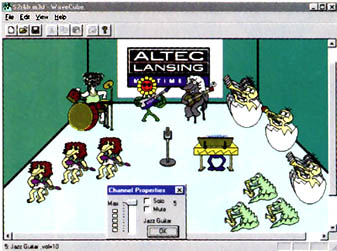
I want better sound than I get from the small, anaemic speakers that came with my multimedia PC. What sound system do you recommend for playing multimedia, games and music CDs?
- Jana Nicol

You're in for a treat! There's a slew of reasonably priced PC sound systems on the market today that provide great audio for CD-ROM multimedia and games, business presentations and Internet music -- they're even good enough to pump out the music at your next party.

Create a custom 3D sound stage with WaveCube, a MIDI utility bundled with 3D Altec Lansing speakers. Drag an instrument around the stage and you'll hear the sound shift in the speakers
Multimedia PCs often come bundled with low-end speakers that sound flat and tinny. You'll get better audio by upgrading to higher-performance speakers with more power, wider frequency response and other sound improvements.
Altec (http://www.altecmm.com), Koss (http://www.koss.com), Labtec (http://www.labtec.com), Nakamichi (http://www.nakamichiusa.com), Yamaha (http://www.yamaha.com) and others offer reasonably priced PC speaker systems. Altec speakers, for example, are used in some Dell and Gateway 2000 PCs. If you're willing to pay more, you can get higher-end speakers that sound as good as a home hi-fi system, from companies like Bose (http://www.bose.com) and Sony (http://www.sony.com). Here are the key buying issues:
Sound card. The sound quality of your multimedia PC depends as much on the installed sound card (or sound-equipped motherboard) as it does on the speaker system. For the best audio reproduction, use a wavetable synthesis sound card capable of delivering 16-bit, 44.1kHz stereo sampling.
Unlike older and inferior FM synthesis cards, wavetable cards let a PC play back digitised samples of real musical instruments and sound effects, providing a vastly superior audio experience. And if you're interested in playing back orchestral MIDI scores or you want full-duplex audio for communications software and interactive gaming, get a card that supports 64 musical instruments (instead of only 32) from Creative Labs (http://www.cppl.com.au), Ubi Soft (http://www.ubisoft.com) or others.
Two-piece versus three-piece speakers. Many two-piece speaker systems can produce excellent sound for any number of applications. But the most popular systems these days are three-piece speakers: two satellites (left and right speakers) and a separate subwoofer. The satellites manage mid- to high-range frequencies (150Hz to 20kHz), while the under-desk subwoofer handles the low range (20 to 150Hz), creating a much stronger and more distinct bass. If you're not ready for bone-rattling bass, you can go with a two-piece system that has an optional subwoofer output jack in case you want to upgrade later.
Speaker performance. The best way to judge performance is to audition the speakers with your own ears. You'll generally find the best listening rooms at consumer electronics and hi-fi stores. If possible, take your favourite music CDs with you for the test drive, and play a wide variety of recordings.
Speaker controls. Manual controls for power, volume, tone, mute and such are generally faster and easier to use than software-based controls -- as long as all the knobs are within easy reach.
3-D sound. If you're a game or multimedia enthusiast, three-dimensional sound may add a lot to your enjoyment. Several 3-D sound technologies are available, each creating the illusion (with just a two- or three-piece speaker system) that you're surrounded by sound. To hear 3-D audio, you need a speaker system or sound card that supports 3-D sound technology, as well as a CD-ROM multimedia title or game that has 3-D audio. By itself, a sound card with 3-D audio-processing capabilities can provide "surround sound" on any two speakers, but you'll get better results from a speaker system designed to reproduce 3-D audio. And such speakers can provide surround sound even if your sound card lacks 3-D audio support.
Several manufacturers offer speakers that support various 3-D sound technologies, and many MMX-enhanced multimedia titles provide 3-D sound.
- Richard Jantz
|
Category: Hardware
Issue: Sep 1997
Pages: 176
|

Pick the right speakers

Pick the right speakers